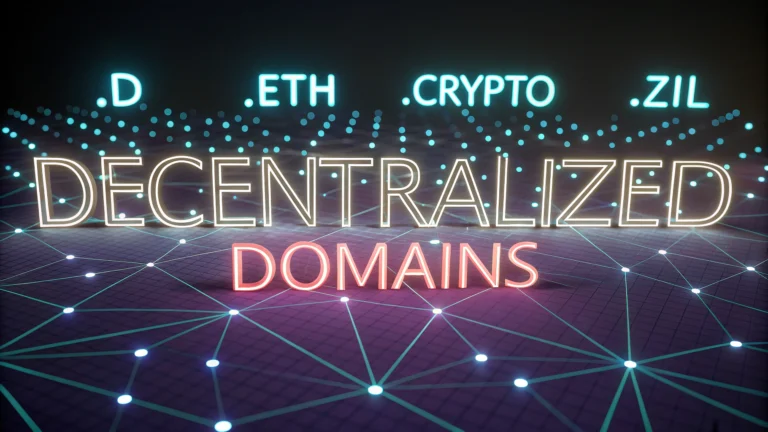Decentralized domains represent a revolutionary approach to web addressing that removes traditional centralized control from domain name systems.
Blockchain technology powers these domains, allowing users to own and manage web addresses without relying on central authorities like ICANN.
Unlike traditional domain registrations, decentralized domains provide permanent ownership and complete control through cryptocurrency wallets and smart contracts.
Key Benefits of Decentralized Domain Names
Users gain unprecedented censorship resistance with decentralized domains, preventing arbitrary website shutdowns or domain seizures.
Cryptocurrency wallet addresses become immediately more readable, replacing complex alphanumeric strings with human-friendly domain names.
Transaction fees and registration processes become dramatically simplified through blockchain-based domain management.
Popular Decentralized Domain Platforms
- Ethereum Name Service (ENS): Offers .eth domains with robust blockchain integration
- Unstoppable Domains: Provides user-friendly cryptocurrency domain solutions
- Handshake: Develops a completely decentralized alternative naming system
Technical Considerations
Decentralized domains require compatible cryptocurrency wallets and blockchain-enabled browsers for full functionality.
Smart contract protocols ensure transparent, immutable domain ownership records without centralized intermediaries.
Security measures like cryptographic signatures protect domain transfers and prevent unauthorized modifications.
Practical Use Cases
Cryptocurrency traders can simplify wallet addresses using memorable decentralized domain names.
Developers and entrepreneurs gain alternative web addressing methods outside traditional domain registration systems.
International users benefit from domain name systems not controlled by specific governmental regulations.
Potential Challenges
Limited browser compatibility remains a current constraint for widespread decentralized domain adoption.
Complex technical understanding may intimidate non-technical users from exploring these innovative addressing solutions.
Ongoing blockchain network scalability could impact future domain registration and transfer speeds.
Economic and Investment Implications
Decentralized domains represent an emerging digital asset class with significant investment potential. Early adopters can acquire unique, memorable domain names that may appreciate in value over time, similar to how traditional domain names became valuable digital real estate.
The speculative market for blockchain-based domains is rapidly evolving, with some rare or strategically valuable names commanding premium prices. Investors and cryptocurrency enthusiasts view these domains as both functional tools and potential long-term appreciating assets.
Cryptocurrency projects and blockchain startups are increasingly recognizing the branding and marketing value of decentralized domain names. These unique addresses provide instant credibility and memorability in the competitive blockchain ecosystem.
Legal and Regulatory Landscape
The legal framework surrounding decentralized domains remains complex and evolving. Different jurisdictions are approaching blockchain-based domain systems with varying levels of regulatory scrutiny and acceptance.
Intellectual property considerations create interesting challenges for decentralized domain ownership. Traditional trademark protections may not directly apply to blockchain domain registrations, leading to potential legal gray areas.
International regulatory bodies are gradually developing frameworks to address the unique ownership and transfer mechanisms of blockchain-based domain systems. This ongoing process will likely shape the future legal recognition of decentralized web addressing.
Technological Evolution and Future Outlook
Emerging technologies like web3 and decentralized internet protocols are creating increasingly sophisticated infrastructure for blockchain-based domain systems. Innovations in blockchain scalability and interoperability will likely expand the functionality of decentralized domains.
Machine learning and artificial intelligence may play crucial roles in developing more intelligent domain resolution and management systems. Smart contract technologies continue to mature, offering more robust and flexible domain ownership mechanisms.
Integration with emerging technologies like decentralized identity systems and cross-chain communication protocols will further enhance the utility and value of decentralized domain names.
Privacy and Security Considerations
Blockchain-based domain systems offer enhanced privacy protection compared to traditional domain registration methods. Users can maintain greater anonymity and control over their digital identities through cryptographic ownership mechanisms.
Advanced encryption and decentralized storage technologies provide additional layers of security for domain ownership and transfer. Smart contract protocols minimize the risk of unauthorized domain modifications or transfers.
The transparent yet pseudonymous nature of blockchain domains creates unique opportunities for secure digital identity management and reduced personal data exposure.
Conclusion
Decentralized domains represent a transformative approach to web addressing, combining blockchain technology’s transparency and user empowerment with innovative digital ownership models. As the technology matures, these domain systems will likely play an increasingly significant role in how we conceive and interact with digital spaces.
While challenges remain in widespread adoption and technological integration, the potential for decentralized domains to reshape internet infrastructure is substantial. Early adopters and forward-thinking technologists continue to drive innovation in this exciting domain.

